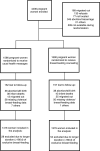Breast-feeding counselling mitigates the negative association of domestic violence on exclusive breast-feeding duration in rural Bangladesh. The MINIMat randomized trial
- PMID: 28659213
- PMCID: PMC10261296
- DOI: 10.1017/S1368980017001136
Breast-feeding counselling mitigates the negative association of domestic violence on exclusive breast-feeding duration in rural Bangladesh. The MINIMat randomized trial
Abstract
Objective: To determine if exclusive breast-feeding counselling modifies the association of experience of any lifetime or specific forms of domestic violence (DV) on duration of exclusive breast-feeding (EBF).
Design: In the MINIMat trial pregnant women were randomized to receive either usual health messages (UHM) or usual health messages with breast-feeding counselling (BFC) in eight visits. During pregnancy (30 weeks), lifetime experience of any or specific forms of DV was measured. Infant feeding practice information was collected from 0 to 6 months at 15 d intervals.
Setting: Matlab, Bangladesh.
Subjects: Pregnant and postpartum women (n 3186) and their infants.
Results: Among women in the UHM group, those who had experienced any lifetime DV exclusively breast-fed for a shorter duration than women who did not experience any lifetime DV (P=0·02). There was no difference, however, in duration of EBF among women in the BFC group based on their experience of any lifetime DV exposure (P=0·48). Using Cox regression analysis, there was an interaction of exposure to any lifetime DV, sexual violence and controlling behaviour, and counselling group with duration of breast-feeding at or before 6 months (P-interaction≤0·08). Among the UHM group, experience of any lifetime DV, sexual violence or controlling behaviour was associated with fewer days of EBF (P<0·05). In contrast, among the BFC group, experience of DV was not associated with duration of EBF.
Conclusions: The experience of DV compromises EBF and the support of breast-feeding counselling programmes could assist this vulnerable group towards better infant feeding practices.
Keywords: Breast-feeding promotion; Domestic violence; Exclusive breast-feeding; Low-income countries.
Figures


 , UHM/no experience of any DV;
, UHM/no experience of any DV;  , UHM/with experience of any DV;
, UHM/with experience of any DV;  , BFC/no experience of any DV;
, BFC/no experience of any DV;  , BFC/with experience of any DV
, BFC/with experience of any DVReferences
-
- Flury M, Nyberg E & Riecher-Rossler A (2010) Domestic violence against women: definitions, epidemiology, risk factors and consequences. Swiss Med Wkly 13, 23–27. - PubMed
-
- World Health Organization (2013) Global and Regional Estimates of Violence Against Women: Prevalence and Health Effects of Intimate Partner Violence and Non-Partner Sexual Violence. Geneva: WHO.
-
- Ellsberg M, Jansen HA, Heise L et al. (2008) Intimate partner violence and women’s physical and mental health in the WHO multi-country study on women’s health and domestic violence: an observational study. Lancet 371, 1165–1172. - PubMed
-
- Yount KM, DiGirolamo AM & Ramakrishnan U (2011) Impacts of domestic violence on child growth and nutrition: a conceptual review of the pathways of influence. Soc Sci Med 72, 1534–1554. - PubMed
-
- World Health Organization & UNICEF (2003) Global Strategy for Infant and Young Child Feeding. Geneva: WHO.
Publication types
MeSH terms
LinkOut - more resources
Full Text Sources
Other Literature Sources
Medical

